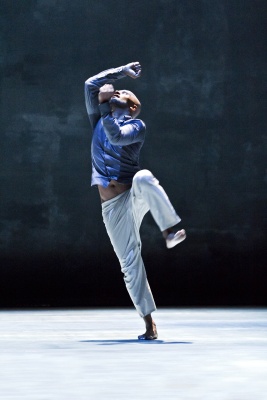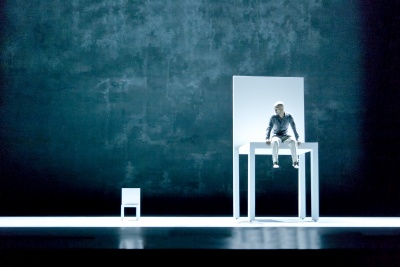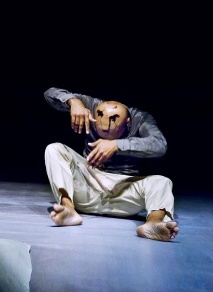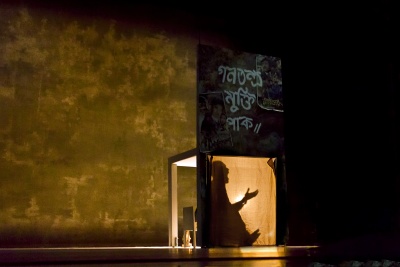 Two years ago the Tanec Praha festival concluded with the production Vertical Road by celebrated choreographer Akram Khan. The author himself did not participate because he does not dance in this piece. We admired a great performance by eight dancers, thanks to whom we got to know the style of this, it can be said, "star" of contemporary choreography. This year Prague got right to the source. Akram Khan arrived in person and, on top of that, with one of his most successful works, a solo with strong personal undertones called DESH. The production, the name of which means "homeland" in Bengali and at the same time is the short form of Bangladesh, the homeland of his parents, was created by London-born Khan in 2011 and won, among others, an award for the best British dance production of the season.
What is the strength of this autobiographical quest for his father's memories? First of all, it is the very theme and the fact that Akram Khan goes through his personal story on the stage, he reveals his complicated relationship with his father and every gesture is pleading and genuine. Then there is a large team of creative individuals behind him, whose joint work makes the eighty-minute solo, in other circumstances maybe hard to imagine and “endure”, a thrilling show. And this works to such an extent that upon leaving the theatre, one does not really feel like he or she was watching all the time just one little big man, struggling with his dual identity – the suppressed Bangladeshi one and, in contrast, the western, English one.
Two years ago the Tanec Praha festival concluded with the production Vertical Road by celebrated choreographer Akram Khan. The author himself did not participate because he does not dance in this piece. We admired a great performance by eight dancers, thanks to whom we got to know the style of this, it can be said, "star" of contemporary choreography. This year Prague got right to the source. Akram Khan arrived in person and, on top of that, with one of his most successful works, a solo with strong personal undertones called DESH. The production, the name of which means "homeland" in Bengali and at the same time is the short form of Bangladesh, the homeland of his parents, was created by London-born Khan in 2011 and won, among others, an award for the best British dance production of the season.
What is the strength of this autobiographical quest for his father's memories? First of all, it is the very theme and the fact that Akram Khan goes through his personal story on the stage, he reveals his complicated relationship with his father and every gesture is pleading and genuine. Then there is a large team of creative individuals behind him, whose joint work makes the eighty-minute solo, in other circumstances maybe hard to imagine and “endure”, a thrilling show. And this works to such an extent that upon leaving the theatre, one does not really feel like he or she was watching all the time just one little big man, struggling with his dual identity – the suppressed Bangladeshi one and, in contrast, the western, English one.Khan's artistic expression and, it should be noted, performance are extraordinary – he spins lightning-fast pirouettes all over the stage, his hands shape spirals around his head, he is incredibly fas
 t and accurate. At the same time he moves in space like water, his dancing flows from one spot to another. Over the years he has created his original movement style, mixing classical Indian dance kathak with the western style of contemporary dance. Anyway, in DESH it is not dance that is the main focus of artistic exploration, at the forefront there is the story and the message itself that Khan conveys through employing imaginary characters as well, such as a poor Bangladeshi chef (a brilliant pun with a face painted on the top of his bald head) and a little girl.
t and accurate. At the same time he moves in space like water, his dancing flows from one spot to another. Over the years he has created his original movement style, mixing classical Indian dance kathak with the western style of contemporary dance. Anyway, in DESH it is not dance that is the main focus of artistic exploration, at the forefront there is the story and the message itself that Khan conveys through employing imaginary characters as well, such as a poor Bangladeshi chef (a brilliant pun with a face painted on the top of his bald head) and a little girl.The action on stage resonates with the music, composed by Jocelyn Pook, which is emotional and although quite catchy, aptly creates a distinctive atmosphere to particular images. The production catches the spectator’s eye also with its elaborate stage design (Tim Yip), where Khan's character becomes a part that is in symbiosis with others – the projection, mise en scene and lighting design (Michael Hulls).
Akram Khan talks of art as a mirror of our lives. In DESH he puts the mirror in front of himself and his relationship with his father and his homeland, all of this in such a way that makes it one of the exceptional works that are pure and intense. We need more of them!
Written about the performance on July 3rd, 2013 at the State Opera, Prague.
 DESH
DESHStage director, choreography, interpretation: Akram Khan
Visual design: Tim Yip
Music composer: Jocelyn Pook
Lighting design: Michael Hulls
Authors of stories: Karthika Nair, Akram Khan
Written down: Karthika Nair, PolarBear, Akram Khan
Dramaturge: Ruth Little
Creative acting director: Zoë Nathenson
Voice of Eshita: Sreya Andrisha Gazi
Voice of Juia: Eesha Desai
Author of video animation: Yeast Culture
Stage construction: Sander Loonen (Arp Theatre)
Costume supervisor: Kimie Nakano
Technical director: Fabian Piccioli
Sound designer: Nicolas Faure
Technology coordinator: Sander Loonen
Sound engineer: Marcus Hyde
Technicians: Stephane Dejours, John Valente
Rehearsal director: Jose Agudo
Tour manager: Mashitah Omar
Production: Farooq Chaudhry




